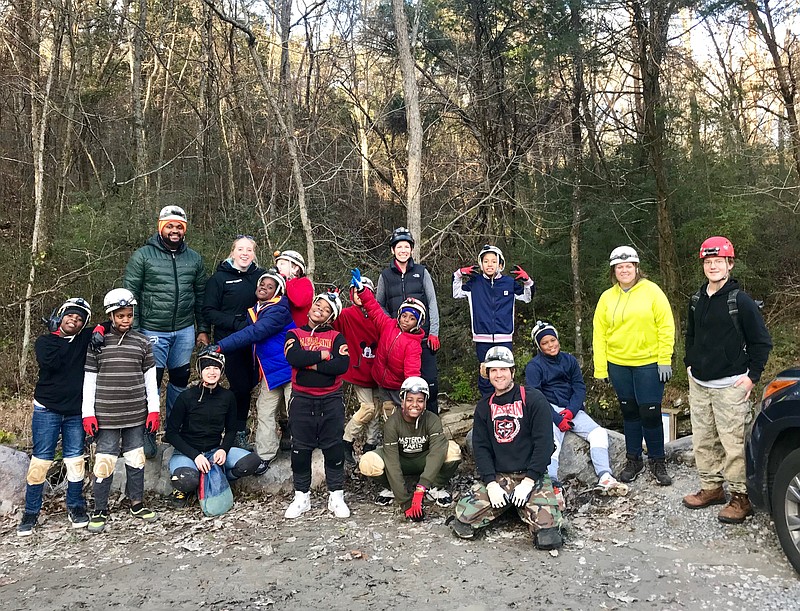When Iyanna Lee started attending Dalewood Middle School as a seventh-grader, she had trouble with anger issues when dealing with teachers and other students. It wasn't until she began participating in an after-school program called Bridge Chattanooga that she learned to control her anger.
"It helped me feel like I was one with myself," she says of the program, which takes a group of Dalewood students, mostly sixth-graders, to do outdoor activities like hiking, caving, swimming and horseback riding for five hours in the afternoon four days a week. She'd enjoyed hiking with her sister in the past, so she decided to sign up.
Leaders of the program gave Iyanna advice on how to deal with her anger, and when she'd feel her emotions start to take over, she'd think about her time spent in nature through the program and it would help to calm her down.
Bridge Chattanooga was started by Clark Brewer and Ryan Keller, who met at a block party hosted by Causeway during Startup Week. The two quickly became friends and began discussing the idea for what became Bridge Chattanooga. Keller, a Glass Street resident and graduate of the University of Tennessee at Chattanooga, brought his experience working in the outdoors with teens through Outward Bound and the YMCA. Brewer, an artist and musician who was a former resident of the East Lake Courts housing projects, wanted to connect kids with opportunities to see parts of the area they wouldn't otherwise be exposed to.
Keller passed away at age 26 as the first semester of the program was just beginning in August of 2017, but that didn't diminish the project's drive.
"There are kids in Chattanooga that don't know about green spaces," says Brewer. "That's a problem, and that's why we wanted to do this. It helps with mental health, trauma – it's free therapy, to hear sounds and see colors outside of their environments."
Some kids are stereotyped into believing that the outdoors are scary, he says, but he's seeing their perceptions change as they complete the semester-long program. Brewer says one of his favorite moments was when a sixth-grader named J.D. told him that going on hikes made him feel like he was "getting to see the world."
While the program is partially about having fun, it also teaches kids skills that are important for outdoor activities as well as everyday life, such as how to be a leader, how to communicate with a group and how to find their voice. "They learn how to keep small problems small, and they learn there are adults they can trust," says Sarah Quattrochi, the program's co-director along with Brewer. Leaders continue to keep in touch with most of the participants, and as they build relationships with the kids, they often build relationships with their families as well, helping to connect them with other resources in the community, she adds.
The program is free for participants, including transportation to activities and back to their homes. For its first three semesters, Bridge was funded under the umbrella of local conservation organization the Tennessee River Gorge Trust. It's now operated under the umbrella of First Cumberland Presbyterian Church, which is located next to Dalewood and where Quattrochi serves as youth and community engagement director. Bridge Chattanooga currently has grant funding from The North Face, REI and the Weldon F. Osborne Foundation, as well as a cooperative grant from Children's Hospital at Erlanger and Kohl's.
To operate the program on a larger scale, they'll need to find more partners and more funding, says Brewer. Last year the program operated on a shoestring budget of about $40,000, and this year the budget is around $75,000, Quattrochi says.
Despite having to do a lot for very little, there are many instances that remind them that it's all worthwhile.
When hiking up a massive incline on a trail in the Tennessee River gorge, a participant said, "Do you think people have limits?" He thought he'd reached his, but kept going until he reached the top. "That sums up why we're doing this," says Quattrochi.
